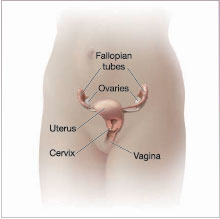|
What is Cervical Cancer?
Cervical cancer begins in the cells of the cervix. Normally,
cells grow and divide to form new cells as the body needs
them. When cells grow old, they die and new cells take their
place. Sometimes, this process goes wrong. New cells form
when the body does not need them, and old cells do not die
when they should. These extra cells can form a mass of
tissue called a tumor, which can be cancer.

 The cervix is the narrow, lower part of the uterus (where the
baby grows when a woman is pregnant). The cervix is made
up of cells that are easily tested with a Pap test.
The cervix is the narrow, lower part of the uterus (where the
baby grows when a woman is pregnant). The cervix is made
up of cells that are easily tested with a Pap test. |
Cervical cancer usually develops slowly. Before cancer
appears, the cervix goes through slight changes where cells
that are not normal begin to appear. Later, these abnormal
cells can become cancer cells and start to grow and spread.
 Thanks to modern medicine, cervical cancer can be treated
if it is found early. In many cases, cancer can be prevented
altogether.
Thanks to modern medicine, cervical cancer can be treated
if it is found early. In many cases, cancer can be prevented
altogether. |
 "If I have no symptoms, why should
I go see my doctor?"
"If I have no symptoms, why should
I go see my doctor?"
|
 Doctor Nguyen:
"Many women may
have cervical cancer without knowing it
because there are no symptoms at first.
I tell all women to make an appointment
to get a Pap test even if they have no
symptoms. Remember, if it is detected
early, cervical cancer can be cured almost
100 percent of the time."
Doctor Nguyen:
"Many women may
have cervical cancer without knowing it
because there are no symptoms at first.
I tell all women to make an appointment
to get a Pap test even if they have no
symptoms. Remember, if it is detected
early, cervical cancer can be cured almost
100 percent of the time."
|
< Previous Section | Next Section > |